Correction Appended
WASHINGTON — In 2002, as evidence of prisoner mistreatment at Guantánamo Bay began to mount, Federal Bureau of Investigation agents at the base created a "war crimes file" to document accusations against American military personnel, but were eventually ordered to close down the file, a Justice Department report revealed Tuesday.
The report, an exhaustive, 437-page review prepared by the Justice Department inspector general, provides the fullest account to date of internal dissent and confusion within the Bush administration over the use of harsh interrogation tactics by the military and the Central Intelligence Agency.
In one of several previously undisclosed episodes, the report found that American military interrogators appeared to have collaborated with visiting Chinese officials at Guantánamo Bay to disrupt the sleep of Chinese Muslims held there, waking them every 15 minutes the night before their interviews by the Chinese. In another incident, it said, a female interrogator reportedly bent back an inmate's thumbs and squeezed his genitals as he grimaced in pain.
The report describes what one official called "trench warfare" between the F.B.I. and the military over the rough methods being used on detainees in Guantánamo Bay, Afghanistan and Iraq.
The report says that the F.B.I. agents took their concerns to higher-ups, but that their concerns often fell on deaf ears: officials at senior levels at the F.B.I., the Justice Department, the Defense Department and the National Security Council were all made aware of the F.B.I. agents' complaints, but little appears to have been done as a result.
The report quotes passionate objections from F.B.I. officials who grew increasingly concerned about the reports of practices like intimidating inmates with snarling dogs, parading them in the nude before female soldiers, or "short-shackling" them to the floor for many hours in extreme heat or cold.
Such tactics, said one F.B.I. agent in an e-mail message to supervisors in November 2002, might violate American law banning torture.
More senior officials, including Spike Bowman, who was then the head of the national security law unit at the F.B.I., tried to sound the alarm as well.
"Beyond any doubt, what they are doing (and I don't know the extent of it) would be unlawful were these enemy prisoners of war," Mr. Bowman wrote in an e-mail message to top F.B.I. officials in July 2003.
Many of the abuses the report describes have previously been disclosed, but it was not known that F.B.I. agents had gone so far as to document accusations of abuse in a "war crimes file" at Guantánamo. The report does not say how many incidents were included in the file after it was started in 2002, but the "war crimes" label showed just how seriously F.B.I. agents took the accusations. Sometime in 2003, however, an F.B.I. official ordered the file closed because "investigating detainee allegations of abuse was not the F.B.I.'s mission," the report said.
The inspector general, Glenn A. Fine, found that in a few instances, F.B.I. agents participated in interrogations using pressure tactics that would not have been permitted inside the United States. But the "vast majority" of agents followed F.B.I. legal guidelines and "separated themselves" from harsh treatment, the report says.
The report says that the F.B.I. "had not provided sufficient guidance to its agents on how to respond when confronted with military interrogators" who used interrogation techniques that were not permitted by the F.B.I., and that fueled confusion and dissension. But it also says that "the F.B.I. should be credited for its conduct and professionalism in detainee interrogations in the military zones."
Jameel Jaffer, who tracks detainee issues for the American Civil Liberties Union, took a more critical stance, saying the report shows "the F.B.I.'s leadership failed to act aggressively to end the abuse." Mr. Jaffer said the report "only underscores the pressing need for an independent and comprehensive investigation of prisoner abuse."
The report documents in greater detail than ever before the conflict between the F.B.I. and the C.I.A. over interrogation methods, which began with the capture of Abu Zubaydah, a senior Qaeda figure, in Pakistan in March 2002. F.B.I. agents began the interrogation using traditional rapport-building methods, and one agent even provided personal care for Mr. Zubaydah, who had been shot three times and grievously wounded, "even to the point of cleaning him up after bowel movements."
But C.I.A. personnel who took over the case within a few days began to use harsher methods that one F.B.I. agent described as "borderline torture," and which the C.I.A. has acknowledged included waterboarding, in which water is poured over the prisoner's mouth and nose to create a feeling of suffocation.
The report describes extensive debate inside the F.B.I. over the next six months over whether it should continue to observe or assist the C.I.A. with interrogations using harsh methods it believed were counterproductive.
F.B.I. officials, including Pasquale D'Amuro, then the bureau's top counterterrorism officer, believed the physical pressure being used by the C.I.A. was less effective than traditional noncoercive methods, that it would "taint" any future effort at prosecution, and that it "was wrong and helped Al Qaeda in spreading negative views of the United States," the report says.
After the capture of another Qaeda figure, Ramzi bin al-Shibh, in September 2002, F.B.I. agents again traveled to a secret C.I.A. site where Mr. bin al-Shibh was being questioned. But only in 2003, the report concludes, did the F.B.I. make a "clean break" and choose to have no involvement in the C.I.A.'s harsh interrogations.
The report said several senior Justice Department Criminal Division officials raised concerns with the National Security Council in 2003 about the military's treatment of detainees but saw no changes as a result. One Justice Department official said he believed that John Ashcroft, the former attorney general, had spoken to Condoleezza Rice, then the national security adviser, about the department's concerns about interrogation methods being used in late 2002 on Mohammed al-Qahtani, a Qaeda member who was believed to be the so-called 20th hijacker in the attack of Sept. 11, 2001.
But Mr. Ashcroft declined to be interviewed by the inspector general's office of the department he had headed, an unusual refusal and one that hampered investigators' effort to learn of discussions inside the National Security Council , the report says.
A spokesman for Mr. Ashcroft, Mark Corallo, said the former attorney general had not cooperated because "his conversations with the White House and with staff on national security matters are privileged."
The report says that while some Justice Department officials believed that the physical pressure techniques being used by the military were wrong, others merely thought they might be ineffective.
A Pentagon spokesman, Bryan Whitman, noted that abuses at Guantánamo were the subject of a 2005 Defense Department investigation that found no evidence of torture, though it did fault some interrogation tactics and called the Qahtani interrogation degrading and abusive.
The Justice Department said it was pleased that the report "credited the F.B.I. for its conduct and professionalism during interrogations."
A C.I.A. spokesman said the harsh methods it used were "found lawful by the Department of Justice itself" and were "employed only when traditional means of questioning — things like rapport-building — were ineffective."
This article has been revised to reflect the following correction:
Correction: May 22, 2008
A capsule summary on Wednesday for an article about
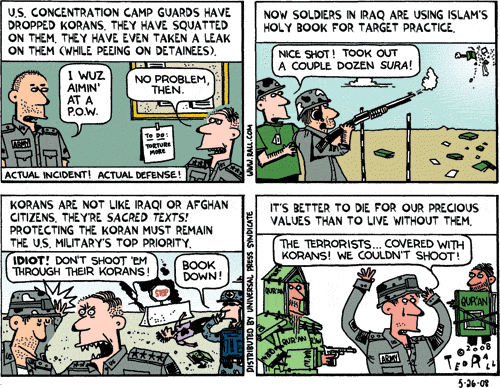


 When host Whoopi Goldberg raised the issue of George W. Bush's comparing anyone who wants to talk to Iran or Syria with the appeasers of Nazi Germany on Monday's edition of ABC's The View, the panel erupted into furious debate.
When host Whoopi Goldberg raised the issue of George W. Bush's comparing anyone who wants to talk to Iran or Syria with the appeasers of Nazi Germany on Monday's edition of ABC's The View, the panel erupted into furious debate.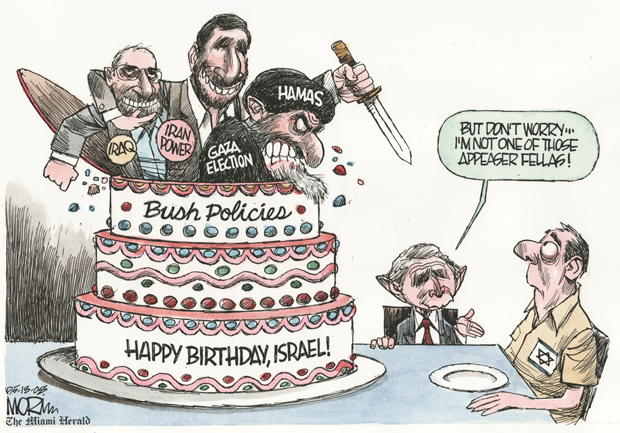


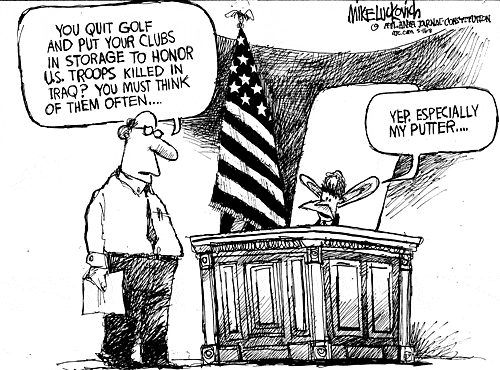

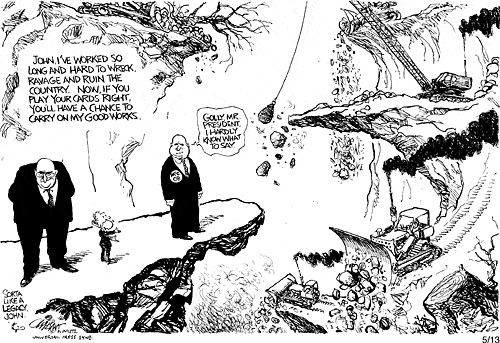
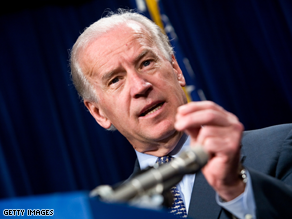
Posted May 19, 2008 | 11:48 AM (EST)